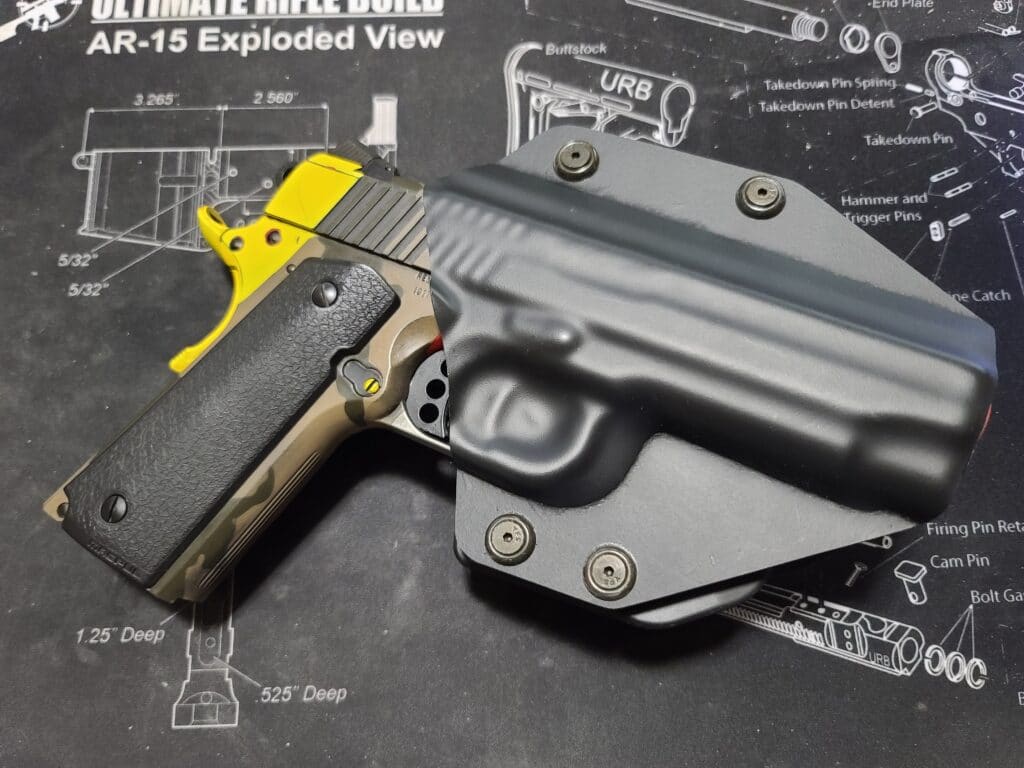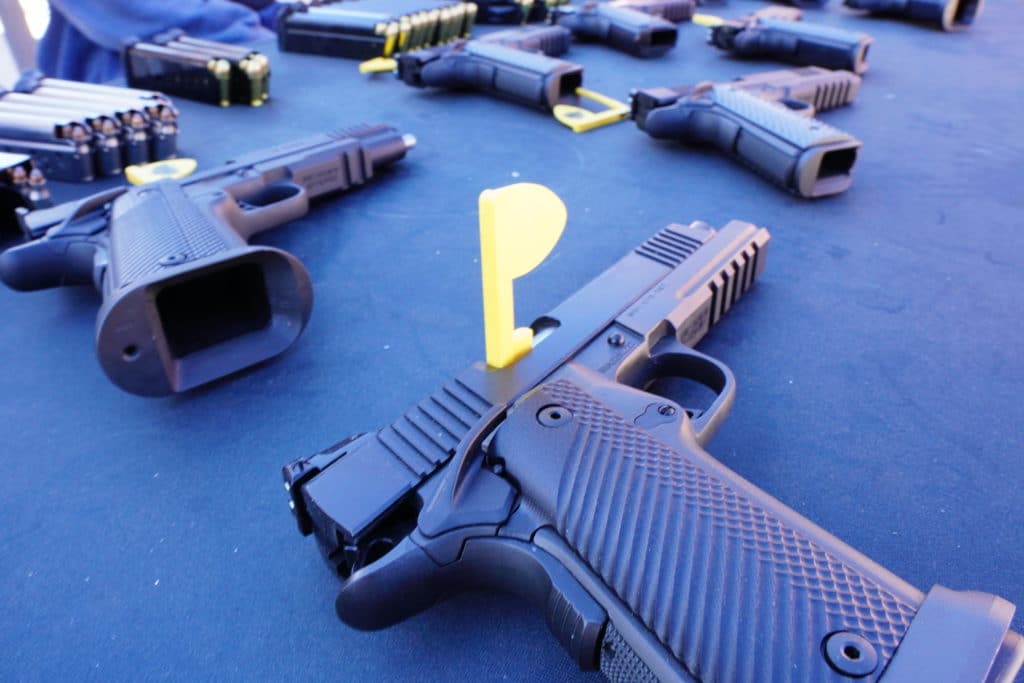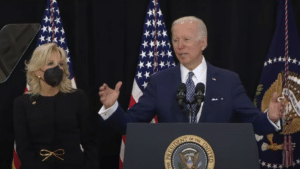It’s deja vu all over again.
A controversial provision in New York’s latest gun-carry law has been found unconstitutional by a federal judge. The same provision, alongside many others, was found to violate the Second Amendment just two weeks ago by a different federal judge. Both judges found the state’s attempt to completely ban gun carry on church property, even by licensed individuals with the church’s approval, doesn’t pass the Supreme Court’s Bruen test.
The difference this time around is New York isn’t going to be allowed to keep enforcing its ban while the case moves along. The new ruling has not been stayed. At least, not yet.
Contributing Writer Jake Fogleman takes a close look at what’s in the latest ruling, which features a far more detailed examination of the church ban, and what it means for New York’s law moving forward.
Then I examine why Americans seem to have lost interest in gun politics just as the elections are getting closer. We had several historic gun-related events this summer, but now only one percent of Americans view guns as their top issue. What happened?
Plus, Cam Edwards of Bearing Arms joins the podcast to talk about what impact guns will ultimately have on the midterms.

Analysis: The New York Gun-Carry Law’s Grim Start in Court [Member Exclusive]
By Jake Fogleman
New York’s new gun law, meant to rebuff the Supreme Court, is already having a rough go of it in federal court.
Just two weeks after a federal judge ruled broad swaths of the Concealed Carry Improvement Act (CCIA) unconstitutional in an opinion granting a Temporary Restraining Order (TRO), another federal judge did the same for the law’s felony prohibition on licensed gun carry in places of worship.
“The nation’s history does not countenance such an incursion into the right to keep and bear arms across all places of worship across the state,” Judge John Sinatra wrote in his opinion granting a TRO. “The right to self-defense is no less important and no less recognized at these places.”
Unlike the previous TRO granted against portions of the law, Judge Sinatra declined to add a temporary stay to his ruling. That means licensed gun carriers in the state are now free to carry a firearm for self-defense while attending church or any other religious institution without fear of committing a state felony. That’s a limited but key win for concealed-carry advocates.
Moreover, the decision adds to the growing body of case law examining modern gun-carry restrictions. Judge Sinatra conducted a robust evaluation of the place of worship provision utilizing the framework laid out by the Supreme Court in New York State Rifle & Pistol Association v. Bruen.
“In Bruen, the Court made the Second Amendment test crystal clear: regulation in this area is permissible only if the government demonstrates that the regulation is consistent with the Nation’s historical tradition of sufficiently analogous regulations,” Judge Sinatra wrote. “New York fails that test. The State’s exclusion is, instead, inconsistent with the Nation’s historical traditions, impermissibly infringing on the right to keep and bear arms in public for self-defense.”
New York attempted to justify its church ban by pointing to place of worship restrictions enacted in the states of Texas, Georgia, Missouri, and Virginia between 1870 and 1890. Judge Sinatra, however, was unpersuaded that such laws constituted a tradition pursuant to the Bruen test because they are “outlier” laws.
“The State relies on a few laws from the late-1800s to insist that a relevant tradition exists,” he said. “Bruen anticipates this argument. Rejecting the relevance of an outlier analogous law and state-court decisions, the Court stated that it would, ‘not give disproportionate weight to a single state statute and a pair of state-court decisions. As in Heller, we will not stake our interpretation of the Second Amendment upon a single law, in effect in a single [State], that contradicts the overwhelming weight of other evidence regarding the right to keep and bear arms for defense in public.'”
In a footnote, he explained that the laws in Georgia and Missouri, unlike New York’s current law, were ultimately interpreted to allow church leaders to decide for themselves whether to allow armed congregants. He also noted that New York failed to identify a single analogous law enacted between the time of the founding and 1870. In contrast, he documented the existence of certain colonial-era laws that actually mandated carrying firearms when attending a place of worship.
“The Constitution requires that individuals be permitted to use handguns for the core lawful purpose of self-defense,” Sinatra said. “And it protects that right outside the home and in public. Nothing in the Nation’s history or traditions presumptively closes the door on that right across every place of worship or religious observation.”
He argued that right, guaranteed by the Second Amendment, forecloses the ability of state governments to implement certain gen policies.
“New York’s exclusion violates ‘the general right to publicly carry arms for self-defense,'” he wrote. “It, too, is one of the policy choices taken ‘off the table’ by the Second Amendment.”
Federal courts have now twice sternly rebuked New York over its failure to heed the direction set forth by the Supreme Court. Aside from amending or outright repealing the CCIA, the state’s options for continuing to resist current Second Amendment jurisprudence are limited.
New York, for its part, has already appealed the first TRO to the Second Circuit Court of Appeals. It could do the same with the new order.
It has had some limited success on this front already. A Second Circuit judge threw the state a lifeline by placing an administrative stay on the first TRO issued against most of the law, allowing it to remain in full until a three-judge motions panel gets around to reviewing the validity of the TRO. That panel has yet to act so much of the law remains in force for the time being.
New York could choose to pursue the same strategy with regard to its church gun ban. But it seems likely that will only delay the inevitable. Both Judge Suddaby and Judge Sinatra have already demonstrated how the most controversial sections of the law fail under the Supreme Court’s Bruen standard. And, as Judge Suddaby pointed out in his TRO opinion, the criteria for granting a TRO and a preliminary injunction are virtually identical.
Therefore, even if New York can scuttle the TROs that continue to be issued against its law, the imminent injunction hearings seem likely to put them right back where they started.
That bodes well for gun-rights advocates, not only those directly impacted by New York’s restrictive law but for those in similarly situated states as well. California and New Jersey appear to be competing to see who can be the next former may-issue state to replicate New York’s gun restrictions. If and when those copycat bills pass, gun-rights advocates in those states will have a roadmap and caselaw for challenging those laws in court.
Podcast: Looking Ahead at the Midterms With Bearing Arms’ Cam Edwards [Member Early Access]
By Stephen Gutowski
The election is fast approaching, and they will determine control of Congress as well as the future of federal gun legislation.
So, this week, we’ve got Cam Edwards of Bearing Arms on the show to talk about the impact of guns on the midterms. Or, really, whether they will have much of an impact. After all, the most recent polling shows Americans have lost interest in the issue as the election draws nearer.
The gun groups have still raised and spent tens of millions thus far, with more to come. But they’ve all hedged their bets as well by incorporating other issues into their messaging.
Cam noted that very few candidates have focused exclusively on guns either. And those who have, such as Texas Democrat Beto O’Rourke, are struggling to get close to their opponents.
Still, Cam argued the issue is not a non-factor. As he noted, guns are rarely the top issue in a campaign season. Instead, gun policy can help push a close election a few points in either direction. That can be decisive in the very races likely to decide control of Congress.
He also pointed to two gun-related ballot measures that are likely to serve as a real-world test of the issue’s ability to drive votes.
Plus, I explain why I decided to become a CNN analyst and what my role is going to look like.
You can find the show on your favorite podcasting app or by clicking here. You can also watch the full episode on our YouTube channel. Reload Members get early access on Sunday, and everyone else can listen to the show when it goes public on Monday.
Come on the Podcast
One of the many perks of a Reload membership is the opportunity to appear on the podcast. We’ve had a lot of people on the show from all kinds of backgrounds. It’s one of my favorite segments since it gives us all a better insight into the community that makes this publication possible. If you want to come on the show, just reply to this email and let me know!

Analysis: Why Have Americans Lost Interest in Gun Politics Ahead of the Elections? [Member Exclusive]
By Stephen Gutowski
Only one in a hundred Americans list guns as their top priority just a few weeks out from the midterm elections.
That’s a significant decline from what The New York Times found in the aftermath of the Uvalde shooting this summer. YouGov’s two most recent polls put the number closer to five percent but saw a similar decline in interest. Given the advantage Democrats held among those listing it as their top issue, the decline of the gun issue coupled with the rise of economic issues Americans favor Republicans on could prove politically significant.
And it’s not just polling signaling sliding interest in gun politics. You can see it in the midterm ads too. Groups on both sides of the gun debate have diversified their messaging to include issues beyond gun policy.
But why is that decline happening in the first place?
We’re only a few months removed from some of the biggest gun news events in American history. The horror of the attack on Robb Elementary captured the nation’s attention in May. It led directly to a bipartisan bill that imposed the first new federal gun restrictions in decades back in June. On top of that, the Supreme Court handed down the landmark decision in New York State Rifle & Pistol Association v. Bruen recognizing a right to gun carry.
Some of the decline follows the typical pattern seen after a high-profile mass shooting. Initially, interest in and support for stricter gun laws tends to increase significantly. But, as time passes, that interest wains. The new normal after the spike may still end up higher than before the cycle started, which is still a significant long-term problem for gun-rights advocates, but a plateau and decrease is typical.
This time around, there was some variation to the norm. Americans’ support for an “assault weapons” ban, the top priority for many elected Democrats, actually fell after Uvalde. But, more importantly, the federal government passed a gun-control bill.
Senate minority leader Mitch McConnell (R., Ky.) publicly admitted part of the reason 17 Republican senators supported the bill was the calculation it would remove guns as a potential midterm election.
“We’ve lost ground in suburban areas. We pretty much own rural and small-town America. And I think this is a sensible solution to the problem before us, which is school safety and mental health,” McConnell told Politico of the decision in June. “I hope it will be viewed favorably by voters in the suburbs that we need to regain in order to hopefully be in the majority next year.”
It seems that idea did add up. The bipartisan bill did something. Whether that something was good policy that will prevent future attacks is still up for debate. But it appears to have hastened the downside of the trend even though Democrats attempted to extend the issue’s relevance by passing the first assault weapons ban through the House in a generation.
The failure of that bill to move at all in the Senate and the likely long-term impact of the Bruen ruling may also be tempering interest from gun owners who feel more at ease over the threat of new gun bans. Plus, as quickly as Bruen has started to affect the lower levels of the federal court system, the ruling hasn’t yet produced a substantial nationwide impact. Its influence on how the average American thinks about the elections is likely pretty limited at this point.
Ultimately, pocketbook issues are top of mind. Given the state of the economy and inflation, it’s not surprising. Even at their peak, guns never surpassed economic issues as Americans’ top priority.
Still, that doesn’t mean the NRA or Everytown should give up on running ads or trying to turn out their voters.
After all, gun politics are rarely the top issue in a midterm election. Guns can still be a decisive factor because of how intensely a substantial number of voters care about the issue, even if they don’t list it as their top priority. So, while gun politics may not have the same broad-level salience they did earlier this summer, that doesn’t mean they won’t be decisive in some of the closer races.
CNN Sunday Interview
I’m making my debut on CNN this morning during the 11 am eastern hour. It will be my first appearance on the network since I signed on as an analyst. We’ll be discussing my analysis piece on the upcoming elections.
So, please tune in and let me know what you think!
That’s it for now.
I’ll talk to you all again soon.
Thanks,
Stephen Gutowski
Founder
The Reload





